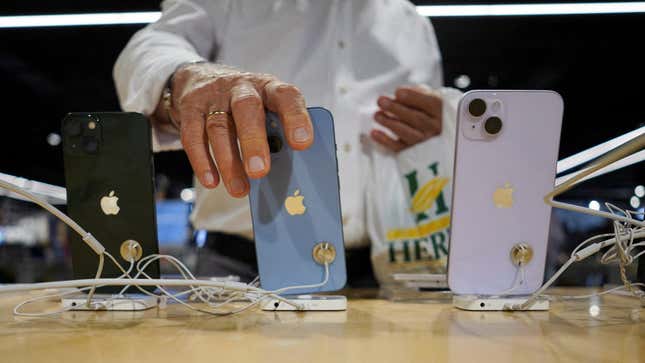
Apple went to the White House yesterday in support of a nationwide right-to-repair law. This isn’t a huge surprise considering the iPhone maker backed a California right-to-repair law a few months ago. But it’s a sharp U-turn from Apple’s stance a couple years ago, when self-repair was out of the question and the company would make independent repair shops sign contracts preventing them from stockpiling spare parts for quick walk-in repairs—all to give Apple’s own repair services an upper hand.
Paying heed to consumer advocates’ complaints that Apple’s devices are inconvenient an costly to fix, it’s ready to provide “access to spare parts, service manuals and repair tools on reasonable terms, regardless of what state Americans live in,” National Economic Council director Lael Brainard announced.
“Apple also supports a uniform federal law that balances repairability with product integrity, data security, usability, and physical safety,” said Brian Naumann, the company’s service VP, as CNBC reported.
As it stands now, items with wholesale prices between $50 and $99.99 would fall under this law for three years from the last manufacturing date, and items with wholesale prices of $100 or more will fall under this law for seven years from the date of final manufacture. Parts that cost under $50 are exempt.
Nathan Proctor, who heads the Right to Repair program with the US Public Interest Research Group (PIRG), posted on X that Apple’s endorsement was “huge for consumers.”
What’s behind Apple’s about-face on resisting right-to-repair laws?
Even now, its stamp of approval isn’t a blanket one. When the Cupertino, California-based company expressed support for its home state’s right-to-repair, it cited “requirements that protect individual users’ safety and security, as well as product manufacturers’ intellectual property.” It also asked for limitations to be levied: The iPhone maker requested repair shops not be allowed to turn off Apple’s anti-theft remote locks and be required to disclose the use of non-genuine or used parts.
Still, instead of resisting the laws from the outside, Apple is choosing to participate in framing the laws from the inside. Perhaps that’s because it realizes the inevitability of the bill’s passing, experts suggest.
Plus, supporting it is good for Apple’s image and reputation. After all, several small-time shopkeepers have had to fold their businesses because of Apple’s pushback on the right-to-repair; there’s heightened regulatory scrutiny around hard-to-fix devices; and not supporting the law would put Apple on the wrong side of the e-waste debate.
Quotable: Apple’s reducing barriers to repair
“We make, use and toss way too much stuff—and it’s way harder than it should be to fix what we already have. As Apple moves to reduce barriers to repair, that’s unequivocally good news. Apple makes a lot of products, and its conduct definitely influences other manufacturers.”
—Nathan Proctor, PIRG’s Right to Repair Campaign Senior Director
A non-exhaustive timeline of Apple’s evolving stance on right-to-repair
February 2017: Apple lobbyists warn Nebraska state lawmakers that the state would become a “mecca” for hackers if its right-to-repair bill passes.
May 2019: An Apple lobbyist meets with the California state assembly’s Privacy and Consumer Protection Committee to delay the right-to-repair bill, sounding the alarm on the possibility of consumers hurting themselves if they accidentally puncture the flammable lithium-ion batteries in their phones.
August 2019: Apple starts distributing parts and manuals to some independent repair shops.
November 2021: Apple extends the availability of some iPhone and MacBook spare parts and tool to the public as well.
April 2022: Apple makes Self Service Repair available.
July 2023: The iPhone 15 Pro’s frame design apparently makes it easier to repair to screen and switch batteries.
August 2023: The Cupertino-based giant backs the right-to-repair legislation in California.
One more thing: Burgeoning support for right-to-repair
Another tech giant—Microsoft—supported a right-to-repair bill in Washington, which it claims “fairly balances the interests of manufacturers, customers, and independent repair shops” to “provide more options for consumer device repair,” two years ago.
And this past January, tractor maker John Deere started allowing consumers to repair their own equipment or get an independent repair shop to do the job.